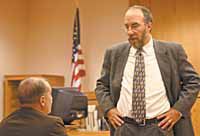| Richard Rosenblatt, an attorney for the United Mine Workers of America, talks with Carl Kingston, the representation for the CW Mining Company, just before proceedings started at the Carbon County Courthouse. |
Many Co-op employees have returned to work after the National Labor Relations Board ruled that the workers were let go inappropriately at the CW Mining Company’s facility
Now, the labor board has taken up the issue of which employees can vote in an election to choose between a union currently at the mine and the United Mine Workers of America (UMWA).
On Tuesday, the matter came under discussion during a hearing at the Carbon County courts complex. NLRB hearing officer Nancy Brandt presided over the proceeding. The UMWA, the existing International Association of Mine Workers and mining company management were represented in the courtroom.
Scheduled to start at 1 p.m., the hearing did not commence until approximately 2:30 p.m. as the lawyers wrangled with questions about payroll records and employees whom the legal counsels could agree on would not be eligible to vote. Brandt involved both sides and the intervener (exiting union) in the discussion so minute details would be resolved when the proceeding began.
The parties agreed that certain confidential and management employees should not be involved in a union vote. Brandt read the names into the official transcript before opening the hearing for counsel statements.
Richard Rosenblat, an attorney from Greenwood, Colo., representing the UMWA, was the first to speak at Brandt’s request.
“C.W. Mining is an employer who is part of the Kingston Order Entities with 173 businesses,” stated the UMWA counsel. “It is a group of family members that has a fundamentalist Mormon belief and that practices polygamy. The evidence will show that many members who work in the mine are either children or grandchildren of supervisors, or children or grandchildren of founding members.”
Rosenblat explained that the issues involved in the case included the following:
•As members of the order, many of the workers are not paid the same way non-members or “outsiders” are. They are paid through a service statement similar to a debit/credit report.
The question, Rosenblat said, is whether members of the order should be allowed to vote because they are family members.
•Every Friday night, the members of the order meet and talk about their jobs.
The members are expected to not fraternize with outsiders other than in the workplace.
•There are approximately 100 employees at the coal mine on a rotation schedule for part-time and seasonal service that should be excluded from voting.
The workers may also be part of the order and may not meet other standards as well, pointed out the UMWA legal counsel.
•Rosenblat indicated he would argue that the members of the order have a lack of common interest with the outsiders who work at the mine.
The UMWA’s legal counsel said the members’ interest lies with the order, not with the bargaining unit, and that is another reason they should be excluded from voting.
At that point, the hearing officer turned to Carl Kingston, who is the legal counsel for the mining company.
Kingston opened his part of the hearing with remarks countering Rosenblatt’s statement.
“The CW Mining Company is a Utah company and is owned by its employees,” noted the attorney. “There is no connection with the order and we believe that no new case law should be created in this action. All employees who work at the mine meet the same criteria and are paid the same. All should be a part of any bargaining unit.”
In addition, Kingston mentioned that he was concerned about some employees who have not returned to work at the Co-op mining operation, but were part of the system before the stoppage.
Rosenblatt conceded that, if the employees have not returned to work, the miners will not be part of the bargaining unit.
After the attorneys’ opening statements, it was the IAMW turn to respond as an intervener in the case.
The mine union opening remarks were short and were delivered by F. Mark Hansen, the counsel for that union.
“We are here to see the evidence and to provide support for our workers and existing members,” he said.
Many people who attended the hearing expected a decision by Tuesday afternoon.
But following the opening remarks, Brandt indicated that she expected the process to continue for at least a couple of days. A decision regarding the union vote matter will be rendered at a later date.

